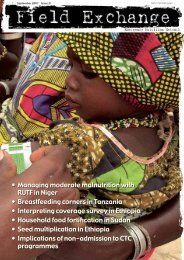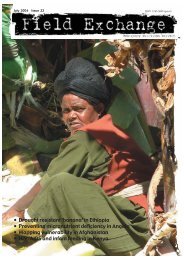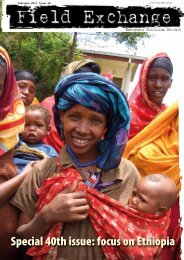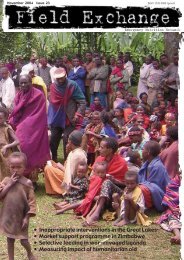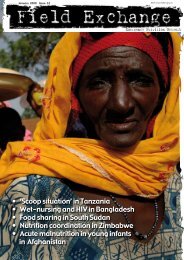Download a PDF of this issue - Field Exchange - Emergency ...
Download a PDF of this issue - Field Exchange - Emergency ...
Download a PDF of this issue - Field Exchange - Emergency ...
You also want an ePaper? Increase the reach of your titles
YUMPU automatically turns print PDFs into web optimized ePapers that Google loves.
their capacity to interpret and analyse<br />
growth measurement results, identify<br />
at-risk children, and analyse possible<br />
causes <strong>of</strong> growth faltering.<br />
Although good coverage has been<br />
shown in small-scale programmes,<br />
reaching all targeted children is<br />
generally difficult to achieve, and<br />
attendance is <strong>of</strong>ten less than desired.<br />
The frequency <strong>of</strong> GMP attendance<br />
<strong>of</strong>ten declined in children <strong>of</strong> older age<br />
groups, and children who were most<br />
at risk attended less <strong>of</strong>ten than better<strong>of</strong>f<br />
children. Health managers<br />
worldwide attribute low attendance<br />
to a lack <strong>of</strong> interest by mothers after<br />
completion <strong>of</strong> vaccination, weak<br />
awareness campaigns to motivate<br />
mothers, and the inability <strong>of</strong> parents<br />
to respond to information provided<br />
during the sessions (due to illiteracy,<br />
inability to understand the growth<br />
chart, or lack <strong>of</strong> access to foods).<br />
A review <strong>of</strong> GMP in seven countries<br />
concluded that GMP is not<br />
implemented appropriately and<br />
attributed its failure to a lack <strong>of</strong><br />
adequate investment and to the fact<br />
that GMP is <strong>of</strong>ten implemented in<br />
isolation from other necessary nutritional<br />
actions. The key<br />
implementation problems were low<br />
coverage (<strong>of</strong>ten the poorest children<br />
had the worst coverage), no action or<br />
low-quality action taken based on the<br />
analysis <strong>of</strong> GM data, and no agreement<br />
on the human, organisational,<br />
and financial resources needed for<br />
successful GMP.<br />
In general, GMP has been shown<br />
to be successful in cases where it was<br />
added to an existing well-managed<br />
and well-supervised health system,<br />
where health workers and community<br />
workers were adequately trained<br />
and recognised for their work, where<br />
accurate equipment and materials<br />
were available, where communities<br />
were involved in the GMP process,<br />
and where culturally appropriate<br />
communication was developed<br />
Important questions to answer in<br />
evaluations <strong>of</strong> GM or GMP<br />
programmes could be:<br />
“Does the measurement facilitate<br />
dialogue and counselling?”<br />
“To what degree does information about<br />
child growth affect the quality <strong>of</strong><br />
counselling?”<br />
“To what extent can community workers<br />
provide quality tailored counselling<br />
based on growth status?”<br />
Such questions need to be answered<br />
by looking at different outcomes,<br />
including the caregiver’s awareness <strong>of</strong><br />
the child’s growth status, knowledge<br />
about necessary care practices, confidence<br />
and satisfaction with the<br />
acquired information during counselling<br />
sessions and child care<br />
behaviours.<br />
A government agricultural extension<br />
<strong>of</strong>ficer showing a farmer how to care for<br />
a cassava plant (FAO supported project)<br />
Political economy <strong>of</strong><br />
adaptation through<br />
crop diversification<br />
in Malawi Summary <strong>of</strong> article 1<br />
The seriousness <strong>of</strong> the problem <strong>of</strong> climate<br />
change and its negative effects on livelihoods<br />
is widely recognised in Malawi, even<br />
though no single coherent policy framework<br />
exists. However, there are several sector policies<br />
such as crop production (1990), national environmental<br />
management plan (1994), national forest<br />
(1996), national irrigation (2000), amongst others.<br />
In addition, Malawi developed and adopted the<br />
National Adaptation Programme <strong>of</strong> Action<br />
(NAPA) in 2006, which serves as a framework for<br />
climate change adaptation efforts in the country.<br />
The objectives <strong>of</strong> NAPA are to improve community<br />
resilience, restore forests, improve<br />
agricultural production and improve preparedness<br />
for floods and droughts.<br />
A recent article examines the opportunities and<br />
challenge <strong>of</strong> climate change adaptation in Malawi<br />
using the case <strong>of</strong> crop diversification. It draws<br />
from an innovative experiment about policy<br />
engagement and influence between two sets <strong>of</strong><br />
researchers: those working with the Research to<br />
Policy for Adaptation project and Participatory<br />
Action Researchers. The former are mainly<br />
experts in policy processes, whereas the latter are<br />
experts in climate change adaptation. The engagement<br />
between these two groups was guided by<br />
the conceptual framework for policy processes<br />
developed in the Knowledge Technology and<br />
Society (KNOTS) team at the Institute <strong>of</strong><br />
Development Studies, UK.<br />
The framework analyses policy processes from<br />
three perspectives: narratives and evidence, actors<br />
and networks, and politics and interests. The basic<br />
thrust <strong>of</strong> the framework is the way in which policies<br />
are talked about, and the associated values,<br />
power relations and politics that frame policies in<br />
a particular way. The framework draws attention<br />
to the fact that policymaking and processes cannot<br />
be reduced to universal recipes that are supposed<br />
to work irrespective <strong>of</strong> the time and place in<br />
which they are adopted. In other words, policies<br />
are more effective when they are informed by an<br />
understanding <strong>of</strong> power relations, incentives and<br />
change processes.<br />
The key findings <strong>of</strong> <strong>this</strong> research included the<br />
following:<br />
• While constantly making references to the ideals<br />
<strong>of</strong> crop diversification, the main preoccupation<br />
<strong>of</strong> the government is to achieve food security<br />
©FAO/Jon Spaull<br />
Research<br />
because <strong>of</strong> its centrality in the country’s electoral<br />
politics. For the government, food security can<br />
be guaranteed by the use <strong>of</strong> high-yielding<br />
hybrid maize varieties.<br />
• Seed companies are keen to promote hybrid<br />
maize seeds since they are their main product<br />
and through the subsidy programme, seed<br />
companies are guaranteed a ready market.<br />
• Donors are interested in promoting a<br />
private sector-driven input supply system<br />
through the promotion <strong>of</strong> agro-dealers to fill<br />
the vacuum following the dismantling <strong>of</strong> the<br />
state-driven input supply system through<br />
liberalisation. This has made hybrid maize the<br />
dominant seed that is made available to farmers<br />
through the input subsidy programme.<br />
• Most communities argue that crop diversification<br />
cannot be a success due to the cultural<br />
orientation that equates food to maize. Foodstuffs<br />
made from alternative cereals, such as<br />
millet and sorghum, are widely perceived as<br />
‘inferior’ to the extent that households resorting<br />
to such foodstuffs are taken to be desperate.<br />
• Most international humanitarian nongovernmental<br />
organisations (NGOs) perceive<br />
crop diversification as desirable but not<br />
attainable as long as weather index insurance<br />
schemes are exploited as commercial ventures<br />
by the private sector. They condemn the<br />
insurance schemes as a barrier to crop diversification<br />
mainly due to their institutional<br />
arrangements. Farmers take loans from a<br />
designated bank, procure seeds from a specified<br />
company, and dispose <strong>of</strong> their produce to<br />
a designated buyer. Not only are the farmers<br />
bound up in a particular institutional arrangement<br />
that effectively curtails their freedom, but<br />
the seed companies involved are known to<br />
promote almost exclusively hybrid maize.<br />
The major lesson from the study is that policy<br />
influence is not merely a question <strong>of</strong> generating<br />
robust scientific evidence and making it available<br />
to policymakers. It is as much about generating<br />
new evidence as it is creating strategic partnerships,<br />
coalitions and alliances. Policy engagement<br />
and influence entails engaging with policymakers<br />
for them to understand the implications <strong>of</strong> new or<br />
even old evidence as vital input into their decision-making<br />
processes. Therefore, the manner in<br />
which evidence is packaged, how it is communicated<br />
to policymakers, by whom and when,<br />
matters a great deal for researchers to effectively<br />
engage with the policy processes and influence<br />
the final outcomes. The main implication <strong>of</strong> the<br />
KNOTS framework is that processes <strong>of</strong><br />
discussing, negotiating, approving and implementing<br />
policies are as important as the scientific<br />
content <strong>of</strong> the policies themselves.<br />
The experience with crop diversification show<br />
that dominant stakeholders almost always have<br />
their way and that implementation <strong>of</strong> crop diversification<br />
has been constrained by a dominant<br />
narrative that equates food security with maize.<br />
The input subsidy programme, which is the single<br />
most important resource in the agricultural sector,<br />
has been captured by politicians primarily to<br />
advance their own political goals. Alternative<br />
narratives had had no significant effect on the<br />
mainstream narrative <strong>of</strong> crop diversification that<br />
equates food security with availability <strong>of</strong> maize.<br />
The case study sheds light on the dynamics <strong>of</strong><br />
political, economic and social processes that<br />
either promote or block pro-poor change.<br />
1<br />
Chinsinga.B, Mangani. R, and Mvula.P (2011).The political<br />
economy <strong>of</strong> adaptation through crop diversification in Malawi.<br />
IDS Bulletin Volume 42, Number 3, pp 110-117, May 2011.<br />
26



